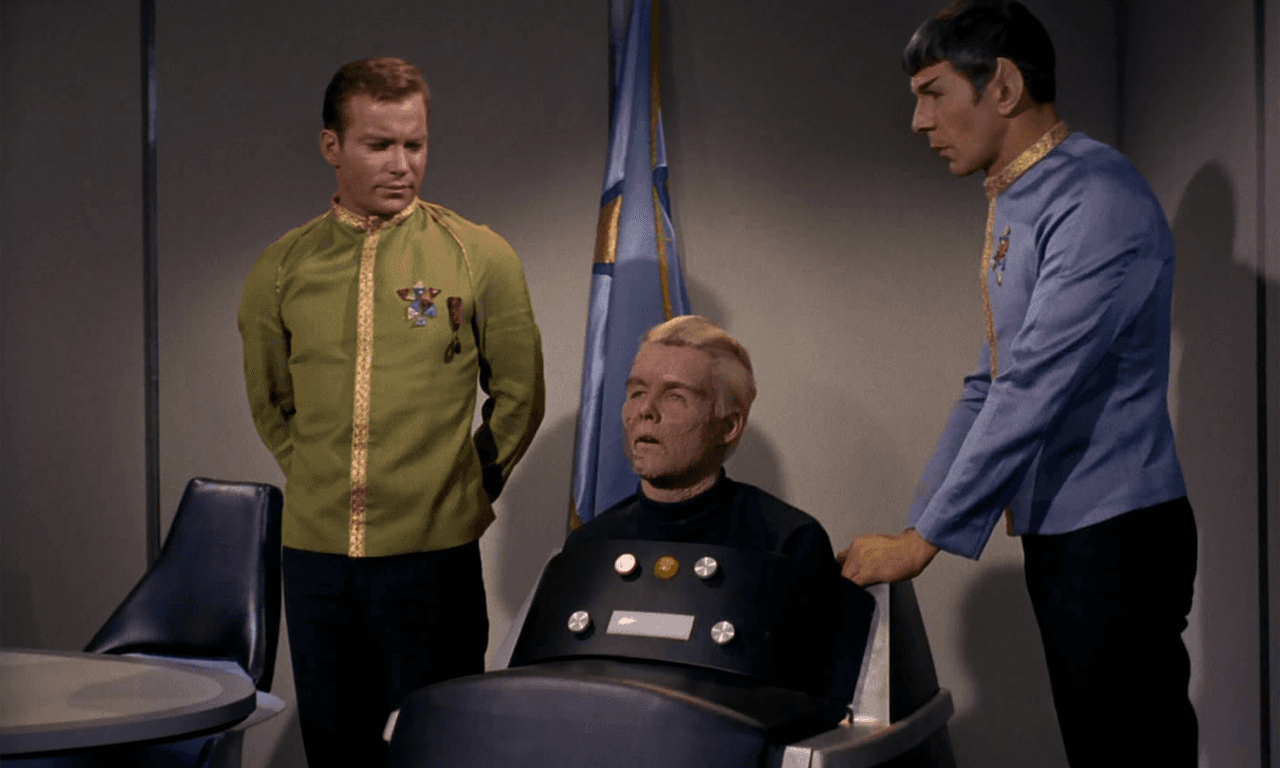If you click on a link and make a purchase we may receive a small commission. Read our editorial policy.
Star Trek has my perfect disability story with Strange New Worlds' Captain Pike
How Anson Mount's portrayal of Star Trek Captain Pike and grappling with PTSD and mental illness helped me.

Popverse's top stories
- "And my axe!" Lord of the Rings star John Rhys Davies says there's one world leader who deserves Gimli's iconic weapon
- Wonder Man is the Andor of Marvel Studios’ modern TV series on Disney+
- Absolute Batman happened because DC Comics writer Scott Snyder got bored reading about ‘superhero fatigue’
Across time, space, and cultures, the hero’s journey has been the archetypal framework used in narratives of personal transformation. These stories often begin with the hero being called to adventure because of their traumatic past. While on their journey, the hero must overcome obstacles designed to help them understand, confront, and accept their traumatic past and how it's defined them, ultimately emerging transformed with newfound wisdom and strength.
Since storytellers often take creative liberties to improve the entertainment value of hero's journey narratives, it's unsurprising that many of these fictional portrayals miss the essence of the experience. And Star Trek stories have historically been no different, treating trauma stories as a narrative graveyard with very few exceptions. However, Star Trek: Strange New Worlds has brought something new to the franchise's utopian vision of the future, with its season-long, thoughtful exploration of how trauma has shaped the lives of the U.S.S. Enterprise crew.
As a trauma survivor myself, I deeply value accurate, compelling representations of mental illness, regardless of whether the character evokes sympathy. What resonates with me in the portrayals of trauma in Strange New Worlds is their authenticity. In particular, I appreciate how trauma is depicted in the series not as a central theme, but as an element that enriches the characters' depth and humanity. After all, mental illness doesn't define a person, nor does it need to take center stage for a portrayal to be both accurate and impactful.
Strange New Worlds, especially in season 2, has redefined the story of Captain Christopher Pike (Anson Mount) so that it's not harmful to the disabled community; it's empowering.
PTSD, media, and me

Caption: Captain Pike learns to deal with his PTSD through a confrontation with himself. Post-traumatic stress disorder (abbreviated as PTSD) and dissociative disorder were added to my list of diagnoses in 2024, making it as long as two CVS receipts stapled together. Due to the combination of having a bowel resection (thanks, endometriosis!) and an eating disorder (thanks, childhood trauma!!), my trauma diagnoses were complicated by a brain injury (thanks, kidney disease!!!), which left my memory even further in shambles. This has meant countless hours of not knowing who I am, of not remembering what are apparently some of my most treasured memories, and of leaving my body only to wake up half-dead in a hospital. Accepting these disabilities, how they limit my life and well-being, and that some of them are due to a traumatic event outside of my control has been hard work, requiring me to move away from home and spend over a year in medical facilities to treat both my physical and mental health.
While in treatment, I spent much of my time thinking about Star Trek, primarily thanks to a dialectal behavior therapist who used Spock to describe the modality's concept of ‘Wise Mind,' which, in therapy, is considered the ideal mindset for making ‘logical' decisions instead of ‘emotional' ones. The Wise Mind lies between the emotional mind (Spock's human side, representing the decision-making and judging based entirely on our emotions or how we feel) and the reasonable mind (Spock's Vulcan side, representing thoughts, decisions, and judgments based entirely on facts and rational thinking), according to a website on dialectical behavior therapy, a therapeutic modality commonly used in trauma treatment.
Sometimes, when you're as neurodivergent as Invader Zim's GIR (seriously, watch me scream, ‘TACO!' during a conversation, then immediately run to the stand), you need a therapist who speaks ‘nerd’ and understands what your mind is trying to process while obsessing about a random fan's San Diego Comic-Con question over disability representation in the Star Trek Universe—and that was precisely what the therapist's Spock analogy did for me. I started to process my own internalized shame over my various diagnoses and disabilities, and my inability to see how the mental ones were impacting me as much as the physical ones.
Society has separated my physical and mental disabilities, often regulating the latter to a fact of life, and so had I. To be blunt, that realization sucks (to be even more blunt, it sucks harder because I always prided myself on being better than that). However, to heal, I must accept that the human brain is prone to categorization and simplification, making personal efforts to overcome internalized shame and implicit biases even harder. Challenging these internalized biases against my identity is where accurate, powerful on-screen rep comes in—making it possible to see a better future for myself, even when those around me cannot.
In other words, it was through dissecting and understanding how Pike moved through the stages of grief to accept his future that I was able to start to accept the potentially lifelong impact of my own traumatic experiences.
Anyone can suffer from PTSD - and many are undiagnosed

When a person experiences or witnesses a perceived or real threat of bodily harm or death, they can develop PTSD. The mental health condition is typically characterized by symptoms such as hypervigilance, nightmares or flashbacks, intrusive thoughts, mood reactivity, adverse reactions to triggers, avoidance of internal and external reminders of the traumatic event, and persistent feelings of guilt, shame, and anger. Although PTSD can affect anyone at any age, the diagnosis is most associated with combat veterans and people who have survived accidents, natural disasters, abuse, or violent events. About six in every 100 people will experience PTSD symptoms in their lifetime, with women being at higher risk of developing it than men, according to the National Center for PTSD.
Not everyone who's diagnosed with PTSD personally goes through a dangerous event. Some people develop PTSD when they learn about a loved one's traumatic event, e.g., survivor's guilt.
In the United States, PTSD is traditionally recognized as a disability under the Americans with Disabilities Act, qualifying some sufferers for workplace accommodations. Likewise, the Social Security Administration will award disability benefits for PTSD if the symptoms are severe enough to interfere with a person's ability to work or perform activities of daily living. To qualify for disability benefits, a person with PTSD must provide documentation of severe emotional distress, frequent flashbacks and/or intrusive thoughts, problems with concentration, memory, or sleep, and difficulty maintaining social or occupational functioning.
Star Trek, disability, and trauma

Set in Star Trek creator Gene Roddenberry's utopian vision of the future, Star Trek stories typically follow the adventures of various starship crews as they explore the galaxy, encounter alien species, and confront moral, ethical, and political dilemmas. At its core, Star Trek emphasizes themes of diversity, diplomacy, and our shared quest for knowledge, often exploring the challenges of peaceful coexistence in a universe filled with numerous species and ideologies.
While Star Trek is often praised for its forward-thinking portrayals of social issues, its handling of disability has historically left representation-oriented fans desiring less ableist approaches to how chronic mental and physical disabilities are handled in the series's portrayal of the future. I believe these complaints are worth mentioning here, so readers can look into research studies on the topic, such as CUNY's 2022 research report examining a half-century of disability in Star Trek, and form their own opinion. However, I'm going to focus on how the franchise has handled PTSD as a disability.
Star Trek uses speculative elements to explore impacts of extreme psychological trauma, like having one's individuality stripped away while in captivity, through characters like Star Trek: Voyager's Seven of Nine (Jeri Ryan) and Star Trek: The Next Generation's Jean Luc-Picard (Patrick Stewart), both of whom struggle with memories of their assimilations into the Borg Collective.
Picard's PTSD is powerfully portrayed in The Next Generation episode ‘Family'—from his intrusive nightmares about his time in captivity to his disconnection from himself and others to his self-blame, feeling that there must have been something he could have done to prevent being assimilated. As a domestic abuse and assault survivor, Picard's storyline in this episode is incredibly relatable, with it mirroring my decades-long effort to try and regain control over my memories of the past. However, while ‘Family’ shows the importance of community, understanding, and acceptance in healing psychological wounds, the episode doesn't go far enough in depicting how Picard learns to live with their memories (instead, that legwork is done in Star Trek: Picard's second season, in which Jean-Luc literally confronts his inner-child).
Similarly, the psychological effects of war and combat, particularly PTSD, are explored in Star Trek: Deep Space Nine episodes like 'Nor the Battle to the Strong,' 'It's Only a Paper Moon,' and 'Hard Time,' where we see characters like Benjamin Sisko (Avery Brooks), Kira Nerys (Nana Visitor), Nog (Aron Eisneberg) and Chief Miles O'Brien (Colm Meaney) dealing with the lingering psychological and emotional toll of what Starfleet officers had to witness during a galactic war.
With these episodes airing before episodic storytelling gave way to the streaming era, the characters' PTSD symptoms often seem to end with the episode, which contrasts with real life. In reality, people often suffer with the after-effects of trauma for years (in fact, a trauma survivor will only get a PTSD diagnosis if they've been struggling with psychological and emotional disturbances for over one month).
An additional concern is that, historically, Star Trek has represented characters with PTSD as vengeful, destructive, and angry, like O'Brien in 'Hard Time,' Picard in Star Trek: First Contact, or James T. Kirk (William Shatner) in Star Trek: The Undiscovered Country. Although those of us who suffer from PTSD sometimes do experience these emotions, they often arise as frustrations over attempts to regain control over the uncontrollable. However, modern Star Trek has gone the extra mile to sensitively and accurately portray PTSD sufferers' lived experiences, especially Pike's journey from Star Trek: Discovery to Strange New Worlds season 2.
The story of Captain Pike: the cowboy and the controversy

What I've most appreciated about Strange New Worlds thus far is how it portrays PTSD in a myriad of ways: M'Benga and Ortegas's avoidance of situations reminding them of combat, Uhura's survivors' guilt following the death of her immediate family, Una's adverse childhood experiences (known as ACES in treatment) with microaggressions and community violence, La'an's traumatic childhood as the sole survivor of an alien attack onboard a Federation colony ship, and Pike's grief about his future, to name a few. Through the characters' various on-screen experiences with trauma—and, in some of their cases, with recovery and post-traumatic growth—viewers who have been through something similar can recognize themselves.
Compared to how it's historically handled physical disabilities, Star Trek has always stood out for its handling of complex issues like trauma. The franchise's modern iterations have some of television's best representations of traumatic stress's many faces—starting with Discovery seasons 3 and 4, I believe largely due to the influence of the franchise's science advisor Erin Macdonald, whose job it is to ensure scientific accuracy and create queer and disabled opportunity in genre stories where these identities are traditionally under-represented. As stated above, while many members of the Enterprise crew struggle with trauma, Pike's story emulates the difficulty of accepting one’s own traumatic experiences and their outcomes.
Although widely respected for his leadership qualities and excellent hair (because the higher the hair, the more respectable the man, right?), some aspects of Pike's character arc—especially his disability and how the character and others respond to knowing his fate—have made him controversial within the Star Trek community.
Actor Jeffrey Hunter originated the character of Pike in Star Trek's first pilot, 'The Cage,' where we see him as an able-bodied captain facing mind-altering aliens. Sean David Kenney later played the character in The Original Series episode 'The Menagerie,' where we learn he suffered an injured that left him paralyzed, unable to speak, and badly scarred. Additionally, in The Original Series, Pike is seen in a brainwave-operated wheelchair, with his only means of communication being through a light on the chair due to the extent of his injuries.

However, when Pike returned in Discovery, played by Mount, the creators decided to delve into the emotional and psychological impact of learning about his future disability, exploring his determination to retain his command and continue his service. While I've heard some argue that it's ableist to have Pike's narrative focus on his 'acceptance' of the disability, rather than on how disabled people can thrive in a future that accommodates them, I disagree. Instead, I believe it mirrors the trauma of my own story and journey to self-acceptance, as well as the stories of many of those who were in treatment with me.
It's traumatizing to experience a life-altering injury and to know the future impact it will have on your well-being. Accepting a future with new limitations is not easy, but that's what's required of survivors. It's even harder to accept that future when it reminds you of past trauma. For a while, I re-lived my trauma–and the feeling of eventual death–every day through immersive flashbacks, intrusive thoughts, and night terrors. Pike goes through something similar, which makes sense as it's common for trauma survivors to re-live their traumatic experiences over and over again, especially before they go through the process of acceptance. Through my own experiences, I learned that acceptance can be even harder for those around you.
Due to his fate, Pike's friends view him as a tragic, fallen hero. Upon learning about his future, Una/Number One (Rebecca Romijn) tells the captain that she won't stop searching for a way to change his future, despite the consequences to others. Likewise, Spock personally makes the ableist decision to re-home his friend so that he can live the rest of his life in a simulation and not suffer through his disability, raising ethical questions about autonomy, quality of life, and morality, especially the morality of the decisions made by his crew when trying to help him.
However, there is no reason to assume that's how Pike feels about his own future. In fact, the events of the series suggest the opposite. Despite the initial trauma of learning about his future in Discovery, he learns to accept it by the end of Strange New Worlds season 1. In the show's first season finale, a version of Pike from the year 2267, who is paralyzed because of radiation exposure, tells his younger self that to change his fate would cause grievous harm to others. Although he’s initially reluctant to accept his future disability, he eventually comes to terms with it, realizing that his injuries won’t stop him from making a difference. But true to life, society and his loved ones can't seem to accept it.
When PTSD is represented thoughtfully, like with Pike's character, it adds depth to characters, making them more complex, human, and relatable. When I began trauma treatment almost a year ago, I couldn’t imagine a life without a daily stream of intrusive thoughts about my inevitable demise. I lived with passive suicidal ideation for so long that it was just a state of being, and honestly, the other side of that threshold, which is where internal peace is found, is something I never thought I would see. But seeing the resilience of fictional characters like Pike, I learned that I can cope, heal, and grow, despite these hardships.
Space may be the final frontier, but there's no end to Popverse's love of the Star Trek universe. Hop aboard the starship Enterprise with our Star Trek watch order, explore strange new worlds with our upcoming Star Trek TV shows and movies list, seek out the new life of the franchise, and boldly go where no Star Trek film has ever gone before - with Quentin Tarantino?
Follow Popverse for upcoming event coverage and news
Find out how we conduct our review by reading our review policy
Let Popverse be your tour guide through the wilderness of pop culture
Sign in and let us help you find your new favorite thing.
















Comments
Want to join the discussion? Please activate your account first.
Visit Reedpop ID if you need to resend the confirmation email.